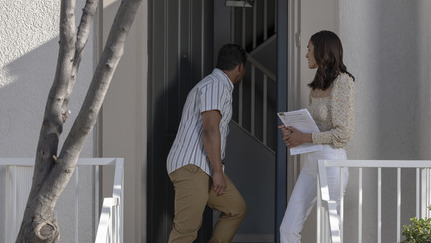1. Shut off the water
You should first stop the leak at its source. Immediately shutting off the water main valve to your house when you discover a pipe burst will stop the flow and hopefully avoid an even bigger disaster. You should also first consider shutting off the power to your home to avoid water-related electrical hazards.
2. Locate the source of the water leak
Once the water is shut off, you’ll need to stay calm as finding the leak could take some time. You’ll need to go through your home room by room checking the floor, ceiling, and walls for signs like bulges (particularly in ceilings) and wet spots.
3. Call a professional
Even if you know how to fix a burst pipe, you're going to want professional support. Call a plumber as soon as you locate the source of your leak.
4. Document the water damage
After you get off the phone with your plumber you might find yourself wondering - does homeowners insurance cover burst pipes? It depends on the situation and your policy. But you’ll need to make sure you properly document all the damage to aid in any claim. Take photos of everything before you start cleaning up.
5. Begin the cleaning and dehumidifying process
Once you’ve documented the scene, it’s time to clean up. You’re in a bit of a race against mold, so don’t waste time getting to this step. Use a mop and/or rags to clear up water pooled on the floor and set up a dehumidifier in affected rooms to handle excessive moisture. You may want to move a dehumidifier near any openings created in the wall to prevent mold spreading.1
6. File a claim with your insurance provider
Use the documentation to file a claim. You may want to speak to a representative from your insurance carrier to talk through the situation and get advice on next steps. A representative may want to assess the situation in person.
Warning signs of a burst pipe
Time is key when dealing with a burst pipe. If you catch the warning signs early, you might be able to save yourself a headache and a lot of money. Be on the lookout for these signs:
- Water marks/stains - If water is leaking behind your walls, it’ll eventually soak through, becoming visible as a dark mark on the exterior of your wall.
- Malfunctioning plumbing – A burst pipe will disrupt the flow of water in your home. You might see weak flow coming from some faucets or no flow at all.
- High water bill – If your water bill seems exceptionally high, it could be because one of your pipes has burst and is using water around the clock.
- Signs of mold – Excessive moisture will eventually lead to mold on your walls. You might also notice a bad smell. 1
How to keep pipes from bursting
To answer this question, you first have to answer a different question – why do pipes burst? One common cause is particularly low temperatures, which can cause the water in a pipe to freeze, expand and burst the pipe. You can get ahead of this by ensuring your pipes are insulated, particularly during the winter. You also should keep your house at a reasonable temperature in the colder months to help prevent pipes from freezing.
You might also consider shutting off your water if you plan to leave your home for an extended period of time.
Nationwide’s smart home program can help prevent water damage and save you money
Nationwide offers a smart home program that uses innovative technology to help keep your home safe from water damage. Learn more about the program.
Most importantly, plan for the possibility a pipe does burst. Have a plumber you trust on speed dial and make sure you’ve got a reliable homeowners insurance plan.
Sources:
[1] “10 Things to Do When a Pipe Bursts in Your Home,” Dan Simms, angi.com/articles/help-my-pipe-burst.htm (Accessed May 2024)
